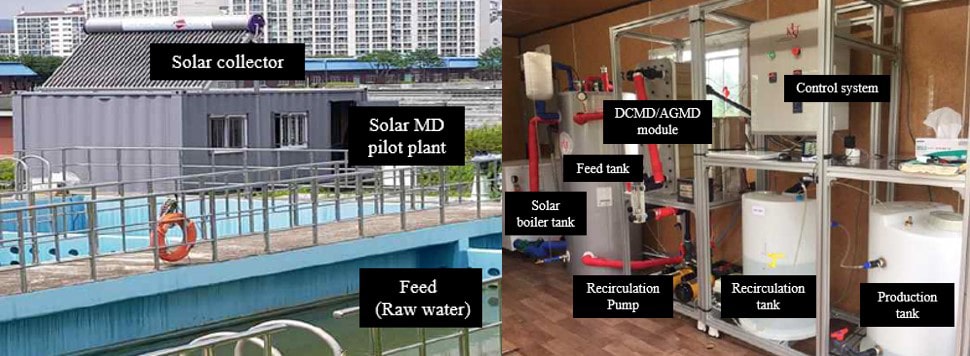Safe, clean water is an essential resource for humans to survive. However, only 3% of the earth’s water can be used for drinking. As a result, there is a scarcity of drinking water for approximately 1 billion people worldwide.
Now a research team at the Korea Institute of Science and Technology (KIST) has developed a hybrid membrane distillation module that combines solar energy with hydrothermal heat pumps to reduce thermal energy consumption during the desalination process.
The membrane distillation method produces freshwater by utilizing the vapor pressure generated by the temperature difference between the flowing raw water and treated water separated by a membrane. This approach has the advantage of low energy consumption, as freshwater can be generated at pressures of 0.2-0.8 bar, which is lower than atmospheric pressure, and temperatures of 50-60 degrees Celsius.
However, the large-scale operation requires more thermal energy. Thus, research studies are required to reduce the use of thermal energy for commercial operation.

The KIST research team developed a hydride desalination technology by conducting on-site tests for one month to compare the system performance and economy using solar energy and hydrothermal heat pumps. When the system operated in parallel with solar energy, production increased by 9.6%, and energy usage was reduced by 30% compared to the membrane distillation method using only hydrothermal heat pumps. Additionally, a comparison of thermal energy consumption depending on the presence of solar energy showed that the efficiency of the membrane distillation plant process increased by up to 17.5% when solar energy was used as an additional heat source.
“The hybrid desalination technology we developed can be considered a method to supply water to some industrial complexes and island areas facing water scarcity as it can reduce the energy consumption required to generate fresh water,” said Dr. Kyung Guen Song, who led the research. “We expect this technology to be applied to significant water supply facilities in the Middle East and Southeast Asia where the annual solar radiation quantity is 1.5 times that in Korea.”
“Membrane distillation is not significantly affected by raw water quality, so it will be possible to supply drinking water to areas where raw water quality became heavily contaminated due to water pollution and areas where heavy metal detection is high,” he added.
KIST develops hybrid desalination technologies to help combat water scarcity
Source: Tambay News

0 Comments